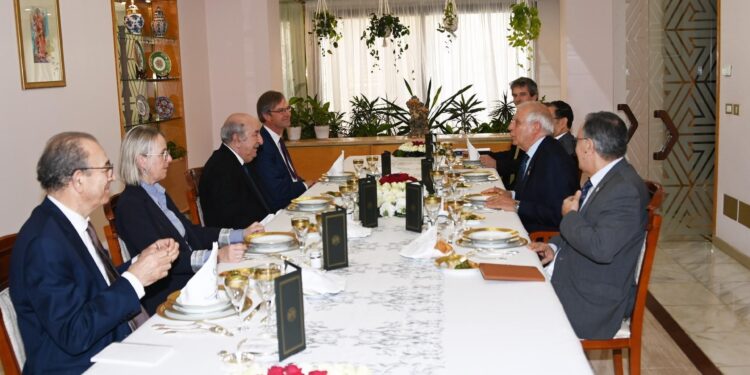Algeria– At the beginning of next year, Algeria is heading to review the association agreement with the European Union, according to what President Abdelmadjid Tebboune announced, who considered that this review is “necessary” and will be carried out with flexibility and a friendly spirit without entering into conflict, since Algeria maintains normal relations with the countries in the bloc. .
Algeria’s partnership with the European Union extends for more than 20 years after the signing of the agreement between the two parties in Spain during April 2002, after which it entered into force in September 2005.
The value of trade exchanges between Algeria and the European Union during the first seven months of this year, according to statistics from the European Commission’s Directorate General for Statistics (Eurostat), amounted to about 27.4 billion euros ($29.9 billion).
Terms of agreement
The Algeria agreement with the European Union included articles defining its methods and the limits of the partnership between the two sides, the most important of which are:
- Providing an appropriate framework for political dialogue between the two parties to allow for the strengthening of their relations and cooperation in all fields that it deems appropriate and the development of exchanges.
- Ensuring the development of balanced economic and social relations between the two parties.
- Encouraging human exchanges, especially within the framework of administrative procedures.
- Promoting cooperation in the economic, social, cultural and financial fields.
- Establishing an area for the free exchange of industrial products and the gradual liberalization of agricultural products, food industries, and fishing products.
- Agreement to cancel customs duties between the two parties in 3 stages, reaching 0% during the period from 2012 to 2017.
- The agreement included measures established by Algeria to protect its national industry through a set of articles, the most important of which are “anti-dumping measures, countervailing measures, and protectionist measures.”
Conduct of the agreement
Algeria and the European Union have not previously reviewed the agreement in its entirety, with the exception of partial reviews related to the first plan to abolish customs duties in 2010, then a joint evaluation at the request of Algeria in 2015, in addition to the evaluation of preferential trade agreements in 2020 at the request of Algeria, which in 2021 imposed restrictions on the import of some Products to protect their national production, which raised the objection of the European bloc, which last June considered it a “ban on European products” and “violates the partnership agreement” between the two parties, hinting at resorting to arbitration before resorting to dialogue.
Professor of Economics, Fares Habbash, believes that there is an imbalance and a violation of the indicators and objectives of the agreement, based on its provisions related to economic, investment and industrial cooperation, technology transfer and investment in the agricultural and technological field, as they remained mere slogans that were not achieved.
In an interview with Al Jazeera Net, Habbash touched on the statistics recorded since the conclusion of the agreement related to European imports to Algeria, which amounted to one trillion dollars, which is a large and unbalanced number compared to Algeria’s non-oil exports to the European Union, which directly affected Algerian local industries. It violates the articles of the agreement.
He pointed to estimates confirming that the cancellation of customs duties led to huge financial losses for Algeria estimated at about 700 billion Algerian dinars ($5.5 billion) since the beginning of the implementation of the agreement.
Why review?
Economist Ahmed Al-Haidoussi said that Algeria’s request to reconsider the partnership agreement with the European Union is due to “changing economic and social conditions more than 20 years after the signing of the agreement.”
The trade balance throughout the previous period was in favor of the European Union, and although the agreement contained some positive points, the European party did not adhere to them, according to Al-Haidousi.
Al-Haidousi indicated, in an interview with Al-Jazeera Net, that the prevailing conditions in Algeria during the beginning of the consultations to conclude the agreement at the end of the nineties of the last century, with Algeria emerging from a difficult period, during which its gross product reached the limits of 100 billion dollars, while the European Union negotiated with Algeria. As a single bloc, its total output reached the limits of 11 trillion dollars, which makes the two parties unequal in size and strength, and the agreement provides Algeria with an outlet to break the isolation in those circumstances it went through, which has changed today with the presence of an Algerian economy that is experiencing recovery and achievements achieved over the past years.
Al-Haidoussi confirmed that there are other cards that Algeria is pushing in its negotiations, such as the security stability that the country is witnessing, in addition to its great potential in the field of energy supply of various types, which makes it negotiate with the European party from a position of strength.
Most prominent challenges
Professor of political science and international relations, Ammar Sigha, says that the political files and the nature of Algerian relations with some European countries in the recent period may have a direct impact through the intersection of the economic and political aspects.
Sigha added, in an interview with Al Jazeera Net, that Algeria is well aware of the repercussions of this decision, despite the previous European threat that the measure would affect the levels of economic exchange between Algeria and the European bloc, and its threat to activate dispute settlement procedures against Algeria previously to object to decisions implemented by Algeria. Since 2021, it aims to regulate imports and stimulate domestic production.
Sigha touched on the importance of the decision as it is strategic in view of the sensitivity of the next stage, which requires Algeria to rearrange its economic, as well as geopolitical, interests in accordance with the intersections of visions in files with a common dimension between Algeria and the European Community.


